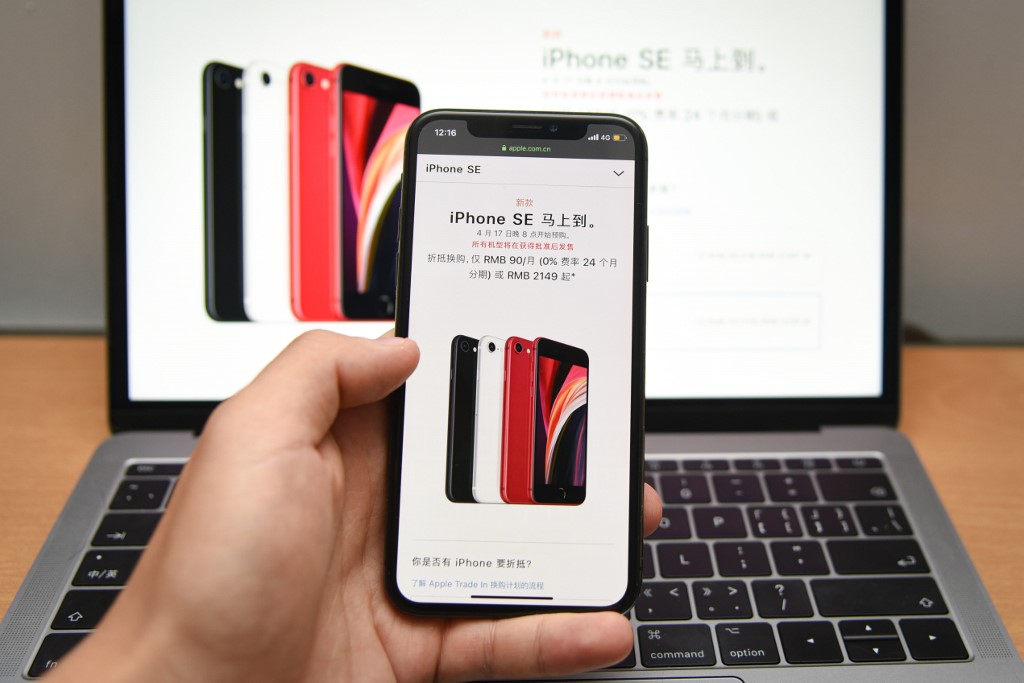Apple on Wednesday unveiled a new entry-level iPhone, aiming to appeal to consumers facing a suddenly bleak economic backdrop.
The updated iPhone SE will start at $399, or less than half the price of its flagship devices, and be available for order as of Friday in more than 40 markets.
Apple made the announcement in a statement, forgoing the normal splashy product launch events of the past few years.
Apple chief executive Tim Cook, who in the past hosted large media events, limited his comments to a tweet, calling the new handset “our most affordable iPhone,” and a “fantastic option in our lineup to help you stay connected, informed and entertained.”
The 4.7 inch display is bigger than the first-generation iPhone SE but smaller than the newest phones, yet offers high-definition graphics for rich visuals.
Apple trimmed costs by leaving out some of high-end features such as facial recognition, giving iPhone SE a fingerprint sensor and a home-screen button which fans will remember from previous generations. It features a single rear camera instead of the multiple lens in the newest iPhone 11.
The iPhone SE includes wireless charging and dual SIMs, and come in black, red or white.
‘Fortuitous timing’
While the iPhone had been in the works for months, the launch comes amid a pandemic-induced economic slump which has hammered the smartphone market and hit consumer sentiment.
“It is incredibly fortuitous timing,” Bob O’Donnell, an analyst with Technalysis Research, said.
“This is the exactly the phone a large percentage of people will want. It’s hard to justify spending $1,200 on a smartphone in this economic climate, yet people still depend heavily on their phones and a lot of people want to upgrade.”
O’Donnell said the new device is also likely to appeal to consumers seeking a small-format handset, and in countries where consumers may have not been able to afford iPhones.
While the timing of a more affordable iPhone is good “given the recession we are likely entering very soon,” Apple would have been shrewd to fuel sales with financing offers such as postponing payments for a year, according to analyst Patrick Moorhead of Moor Insights and Strategy.
Without finance incentives, Moorhead said, “I question how many of these the company actually wants to sell.”
Entry to ecosystem
Wedbush Securities analyst Daniel Ives said Apple had the devices ready “and ultimately decided to release and green light this smartphone to the market in hopes of gaining contained success out of the gates.”
Ives said in a note to investors he expects Apple to sell from 20 million to 25 million iPhone SE handsets by year’s end.
The Silicon Valley company played up the iPhone SE as a portal into its “robust ecosystem” of digital products and services including television and music streaming services.
“The first iPhone SE was a hit with many customers who loved its unique combination of small size, high-end performance and affordable price,” said Phil Schiller, Apple’s senior vice president of worldwide marketing.
“The new second-generation iPhone SE builds on that great idea and improves on it in every way.”
The move comes a week after South Korean colossus Samsung introduced new smartphones that included a model designed to work on much-hyped new-generation 5G mobile networks and priced less than $500.
The new Apple smartphone “fits into a portfolio and hitting the right price with the right features seems like a carefully balanced recipe,” Creative Strategies analyst Carolina Milanesi said.
“It’s a product that serves the purpose of getting the most pragmatic users to upgrade after holding on to their phones for years. These users might be coming from a hand-me-down or a secondhand iPhone or even be Android users looking for their first iPhone.”
Analysts question whether Apple will stick to its schedule of releasing a high-end device in September due to the current economic situation and disruption to the supply chain.
“I’m hearing production is ramping up in most parts of the supply chain,” O’Donnell said. “So they could still release new high-end phones in the fall if they want to. But there is concern about not having enough demand.”
AFP
























